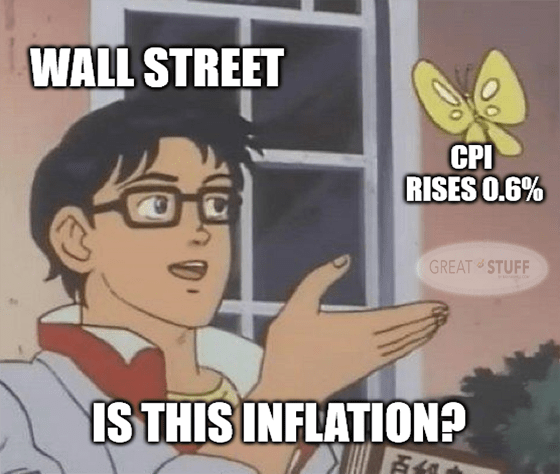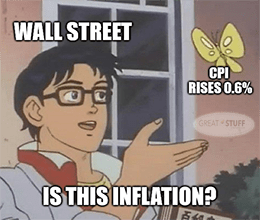
Every Recovery Has Its Thorn
Just like every bear market has its dawn. Just like every investor sings a sad inflation song. Every recovery has its thorn.
Great Ones, did you see what the cat dragged in this morning?
The latest data on consumer prices in the U.S. hint that inflation’s rising at its fastest pace in two and a half years. Every talking head on Wall Street is droning about the 2.6% year-over-year jump in the consumer price index (CPI).
Come on, Mr. Great Stuff! You said inflation wasn’t poison. Give me something to believe in here, will ya?
You are correct, Great Ones. There’s no need to talk dirty to me, so let’s get to the bottom of this…
While the media is tearin’ down the walls over the 2.6% year-over-year figure like some fallen angel, the real story involves three points.
First, the CPI only rose 0.6% month over month … slightly ahead of the 0.5% economists expected. That’s nowhere near as attention-grabbing as 2.6%, so you can see why this growth is typically buried in CPI reports.
Second, gasoline prices accounted for nearly half of the CPI’s increase. In fact, gas prices soared 9.1%, thanks to oil cartels cutting back heavily on production amid a surge in demand.
Third, where were we one year ago? Riding the wind and doing the unskinny bob?
No. We were in a pandemic lockdown. Consumer price growth actually turned negative in 2020 due to collapsing economic growth amid the pandemic. In other words, of course year-over-year comparisons are huge!
This is what’s commonly called the base effect. And, no, we’re not talking about adding a subwoofer to your S-10 pickup truck — I’m looking at you, Dad.
The base effect is the distortion in inflationary figures that results from periods of unusually high or low levels of inflation.
Last year, inflation was so low — How low was it? — that financial talking heads projected negative interest rates in the U.S. And just look at how well that prediction panned out.
The bottom line is that, yes, we’re going to see some big CPI and PPI numbers this year. But there’s no reason to panic … yet. These numbers will appear big because 2020’s growth was just so flippin’ awful.
My advice to you is don’t panic and wait it out. This is exactly what you’d expect from a solid economic recovery.
But, I hear you, Great Ones. You want action tonight, satisfaction all right! Well, you know I won’t forget you, baby. You’ve gotta get a break from the same-old, same-old. And it don’t get better than … Imperium?
A technology called “Imperium” is about to spark the biggest investment mega trend in history … with one small Silicon Valley company at the center of it all.
It’s something that only science geeks know about right now. Yet, according to experts, Imperium is set to go from 1 million users to 2 billion in the next four years, launching a stock market “gravy train” that almost nobody sees coming.
Going: Coin, Based
The cryptocurrency market is all aflutter this week. Why?
Because crypto exchange Coinbase (Nasdaq: COIN) is knock knock knockin’ on the market doors, set to go public tomorrow. While Coinbase’s direct listing is a huge sign of institutional acceptance for crypto trading … certain portions of said institutions are less than happy about the listing to begin with.
Some analysts questioned Coinbase’s near-$100-billion valuation since it implies that the company’s revenue is more than the Nasdaq’s and NYSE’s revenues combined.
Others ruminated (read: whined) about the nature of crypto itself. Notably, a board member of the European Central Bank, who called bitcoin a “speculative asset without any recognizable fundamental value.”
I’d expect nothing less from a central bank manager in clear denial that cryptos started as a direct counterpoint to central banks. Well done.
Coinbase seems to be the latching-on point for crypto fans and deriders alike this week. And at the heart of this general crypto debate is a battle between centralized money control … and everyone else who just wants to pay for things without someone else micromanaging every aspect of the financial system — and then charging us fees for it.
Sure, Coinbase is representative of that fintech divide. But it is just an exchange, and how much of crypto’s glow-up innovation story is priced into COIN’s valuation remains to be seen.
Cryptos are rallying around the news because any crypto news is good crypto news.
¯\_(ツ)_/¯
Going: MMMBop
Mask maven and Post-it potentate 3M Company (NYSE: MMM) had a bad day today. The company was broadsided by Deutsche Bank, which called 3M a “catalyst call” sell this morning.
According to Deutsche Bank, 3M’s recent rally to a fresh multi-year high is disconcerting and a valuation concern. Deutsche Bank also believes that 3M will miss expectations when it steps into the earnings confessional on April 27.
Now, it’s true that 3M could see revenue dip going forward as the pandemic winds down and fewer masks and less PPE are required to combat COVID-19. However, let’s not forget that 3M is an industrial, safety and transportation powerhouse.
In other words, should Congress pass some form of President Biden’s $2.9 trillion infrastructure bill, 3M will benefit. Even the much smaller infrastructure plans favored by Senate Republicans could provide a significant boost for 3M.
Furthermore, MMM’s rise to a two-year high was, in part, fueled by an investor sentiment shift toward value stocks. And 3M is about as “value stock” as you can get. The company not only has exposure to industrial and construction markets, but it’s also a big player in consumer essentials — you know, those products that hold value even during a recession?
So, while Deutsche Bank may be right regarding MMM’s recent value-backed rally, the long-term outlook for 3M remains rosy. If the stock dives following earnings, look for value investors to pounce and send it higher once again.
Gone: One Shot To Rule Them All?
Shot in the arm, and Johnson & Johnson’s (NYSE: JNJ) to blame. Darling, you give vaccines … a bad name!
As I’m sure you’ve heard by now, the CDC halted the J&J COVID-19 vaccine rollout “out of an abundance of caution.” That caution is based around six women who developed a rare blood-clotting issue weeks after receiving the vaccine.
“Right now, these adverse events appear to be extremely rare,” the FDA said in a statement with the CDC. “We take all reports of health problems following COVID-19 vaccination very seriously.”
Just six instances out of the roughly 4 million J&J vaccines administered is extremely rare, indeed. As of right now, however, there’s “no clear causal relationship” between the blood clots and J&J’s vaccine … according to J&J, that is. But the company said that it will work closely with the CDC to assess the situation.
Until more data arrive, I’m standing by one of my favorite idioms: Correlation does not equal causation.
Unfortunately, that’s not how market sentiment works. The mere fact that the CDC pulled J&J’s vaccine means that the vaccine now has a negative public stigma attached. In other words, even if the vaccine was reinstated today, people would have a negative view of it and likely avoid it in favor of J&J’s competitors.
As a result, JNJ dropped nearly 3% today.
I don’t know what everyone’s worried about. I got the J&J vaccine last week, and I feel great. Plus, my 5G reception has never been better.
Well, I don’t participate at all. And I think the world would be better off without them. I think this kind of crazy speculation — an enterprise that’s not even found or picked out yet — is a sign of an irritating bubble.
It’s just that the investment banking profession will sell $#!% as long as $#!% can be sold.
SPAC, crackle, pop — that’s the sound of a fresh Quote of the Week. We’re hitting up the Buffett-adjacent bunch today with Charlie Munger’s musings on SPACs.
It’s almost the converse of what Scott Galloway said last month: “Never underestimate the market’s ability to find products for people who have money.” And since then, the market pushermen have only amped up their hustle, bringing in new hotness via NFTs.
I agreed with Galloway then, and I agree with Munger now. The only way Quantumscape (NYSE: QS) or Nikola (Nasdaq: NKLA) could have gone public is through a SPAC.
Too much discovery can happen in an IPO. Too many eyes prying on S-1s and growth expectations and material weaknesses and juicy deets that otherwise get glossed over in the SPAC shuffle.
Given that the dot-com bubble happened with IPOs … this says some pretty damning stuff about SPACs. Why did investors chase IPOs? Outsized returns after a decade-long bull market. Why are people chasing SPACs now? Outsized returns after an even longer bull run.
Folks are looking for those massive gains they had in the bullish streak’s prime, and SPACs offer a way to get there. Or, at least, that’s what SPAC peddlers would want you to believe.
SPACs are positioning themselves as diamonds in the rough when most are little more than Gobstoppers in a septic tank. And a lot of both retail and institutional investors are diving in with their last bullish gasps.
If enough money is chasing returns like that, then Wall Street will give them something to chase.
Even if it doesn’t technically exist?
Especially when it doesn’t technically exist. That’s exactly what Munger’s saying here. Actually … that’s exactly what we’ve been saying too. For a fair while now.
In fact, we’re overdue for our monthly reminder to stop SPAC’ing your stimulus check tax refund. Before entering SPAC-infested waters, follow our SPAC attack safety checklist:
- Make sure you are OK with potentially losing the money you give to a SPAC.
- Find a SPAC merger that has a legit product or service. Think Hyzon Motors … not Nikola.
- If you invest in a SPAC, make sure it has an actual acquisition plan (and you understand it).
- And yes, I mean a real plan — not some woo-woo doe-eyed “we’re looking for future-builders” BS.
- Look for SPAC mergers with revenue and growth in a stable industry or a market on the verge of disruption.
None of this should sound crazy, but when you have energy SPACs like Quantumscape promising battery tech that’s always just four short years away … you gotta be careful out there, Great Ones. Above all, don’t be surprised if the SPAC you snatch bites you back. Cool?
If you’re braving the froth to sail the SPAC seas, I commend you … and if you aren’t, I don’t blame you. But I do want to hear your thoughts on the SPAC hoaxes and merger choices. Are you buying in? Staying clear of SPACs like Munger?
GreatStuffToday@BanyanHill.com. Drop us a line anytime!
And for all those numerous readers writing in saying “Add me!” or “Sign me up!” … first off, how’d you receive this? Second, all you have to do to sign up for Great Stuff is click here!
Once again: Just click here if you want to sign up for Great Stuff!
Finally, remember what Mr. Great Stuff always says: Like Stuff? Share Stuff! So be sure to share ‘Stuff with everyone right down your email list. Send it all!
And don’t forget! If you want to be in next week’s edition of Reader Feedback, drop us a line at GreatStuffToday@BanyanHill.com! But, if that’s still too many virtual hoops to jump through, why not follow along on social media? We’re on Facebook, Instagram and Twitter.
Until next time, stay Great!
Joseph Hargett
Editor, Great Stuff
